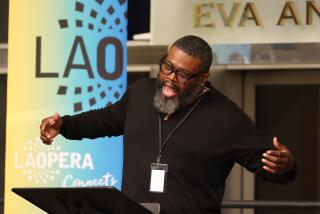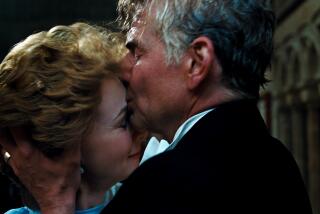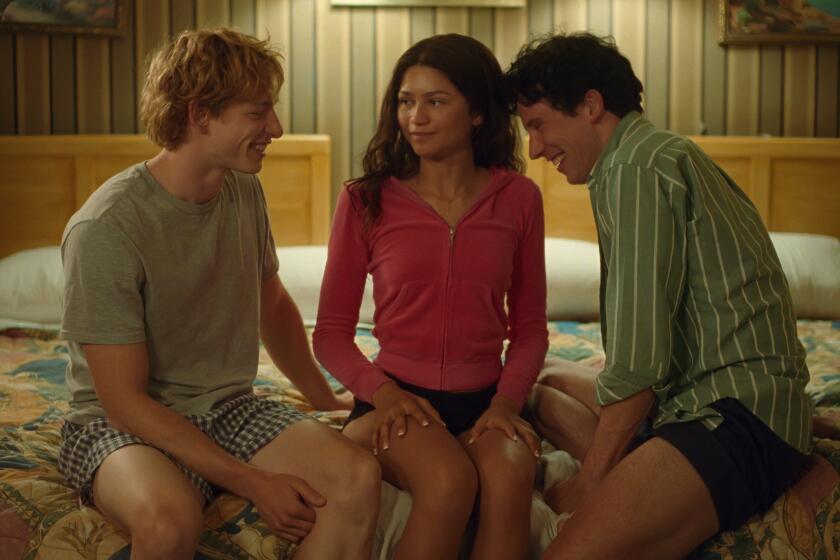Cancer, chemo and ‘The Sacred Veil’: Master Chorale sings a search for solace
Death and thoughts of death loomed over Walt Disney Concert Hall as the Los Angeles Master Chorale premiered Eric Whitacre’s “The Sacred Veil,” the 49-year-old composer’s most ambitious project to date as the chorale’s artist in residence.
Before he began conducting “The Sacred Veil” on Saturday, a smiling Whitacre thanked the audience for coming on such a sunny day, adding in his resonant baritone, “If I were you, I’d be at the beach.”
Indeed, “The Sacred Veil” isn’t for the faint of heart. The nearly hour-long score opens up a psychological and emotional space where love and loss become intimate companions.
For nearly an hour, “The Sacred Veil,” based on a dozen sensitively rendered texts by Whitacre’s longtime friend and frequent collaborator, Charles Anthony Silvestri, carefully balances the personal and universal. It’s a quasi-religious piece, but one that leaves room for spiritually sensitive atheists.
The sacred veil between life and death is a thin one. Silvestri’s wife, Julie, died of cancer at age 36 in 2005, leaving two young children. His largely spare texts (the third, “Home,” reads simply, “You feel like home”) deal with their courtship, abiding love and, ultimately, his search for solace.
Such material lends itself to the deceit of sentimentality. Or to paraphrase the late poet Donald Hall, beware the Hallmark treatment.
But Whitacre and Silvestri are especially careful in setting two passages from Julie’s own words. In “Delicious Times,” the score’s eighth section, she writes about her chemo, with her oldest child shouting to his class at school, “My mom has a wig!” Julie’s good-humored courage under such stress, beautifully rendered with minimal vibrato by the chorale’s singers, is heartbreaking but also bracing. In the 10th section, “Dear Friends,” she asks her friends not to feel pity for her, but to fight with her: “Don’t give up on me.”
“The Sacred Veil” sounds like tough going, and plenty of tears flowed in the audience, but Whitacre’s tender, subtle score gave listeners a metaphorical blanket to hold. To be sure, Whitacre’s ethereal major key harmonies sometimes threatened to smooth things over, but he found contrasting inventive dissonant combinations and unconventional chord progressions that didn’t quite resolve, creating their own thin veils.
In “You Rise, I Fall,” the chorale’s voices slid upward, then slowly descended. In other sections, the voices sounded sitar-like, as if they were bending. In “I’m Afraid,” the fateful sixth section, Julie’s diagnosis was conveyed in slightly sinister, yet pleasingly harmonious, patterns. In contrast, the clinical vocabulary of the text chilled the spine.
The score also included contemplative passages, with solos performed with touching authority by cellist Cécilia Tsan and the chorale’s pianist, Lisa Edwards, in “Home” and in the seventh section, “I Am Here.”
Silvestri is not a cancer patient, and his text can explore the emotions of impending death only from the outside in. Next to “The Sacred Veil,” Michael Hersch’s “I hope we get a chance to visit soon,” which premiered at the Ojai Music Festival in June and also uses personal correspondence from the dead, is a primal scream.
Hersch, who called on his own cancer diagnosis to write about deceased friends, left us little or no consolation. Whitacre eschews Hersch’s terrifying and dramatic you-are-there approach, finding an effective middle ground. Anger seems to play no part in “The Sacred Veil.”
Lighting by Robin Gray was subtle and atmospheric. On the work’s last words, “Welcome home,” the stage went black, an effective way to undercut a moment that could have been cloying.
In “The Sacred Veil,” Whitacre and the Master Chorale memorably celebrate the precarious beauty of life, offering the welcome consolation of art and a momentary stay against our collective fate.
Whitacre began the concert with gorgeous renditions of two of his signature pieces: “Lux Aurumque” (translated as “Light and Gold”) and a setting of e.e. cumming”s “I Thank You God for Most This Amazing Day.”
Support our coverage of local artists and the local arts scene by becoming a digital subscriber.
See all of our latest arts news and reviews at latimes.com/arts.
More to Read
The biggest entertainment stories
Get our big stories about Hollywood, film, television, music, arts, culture and more right in your inbox as soon as they publish.
You may occasionally receive promotional content from the Los Angeles Times.










